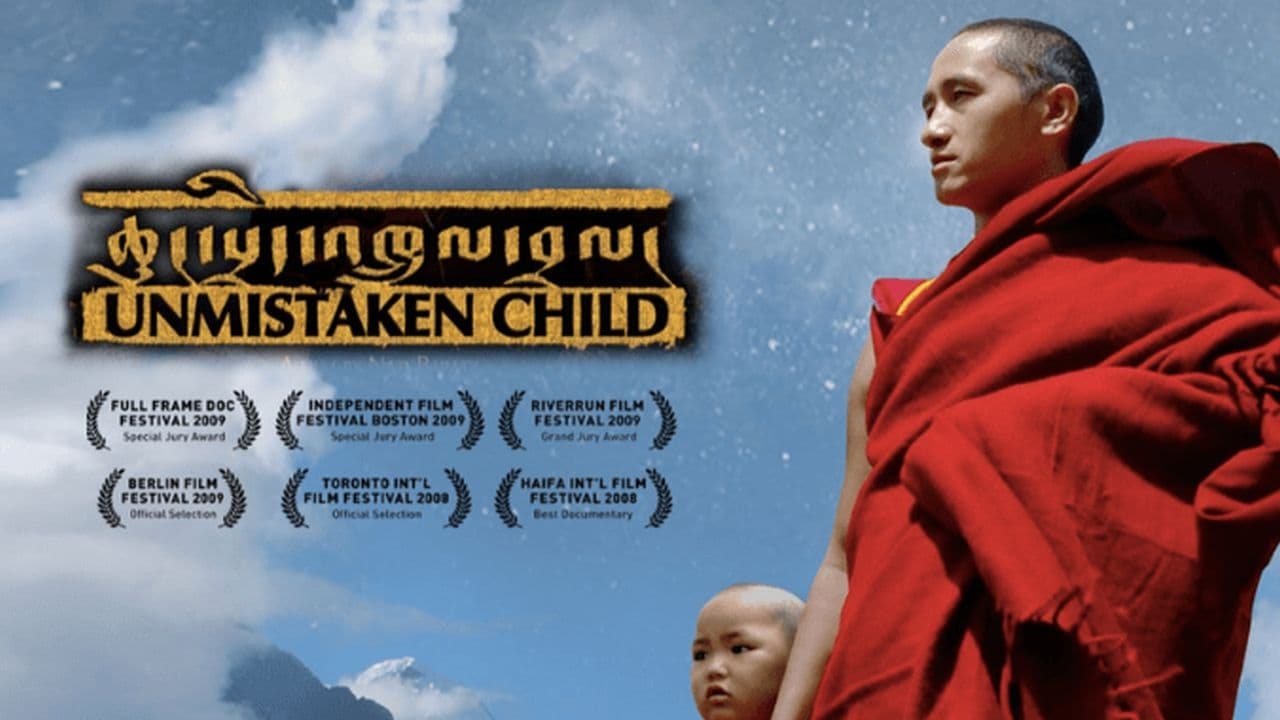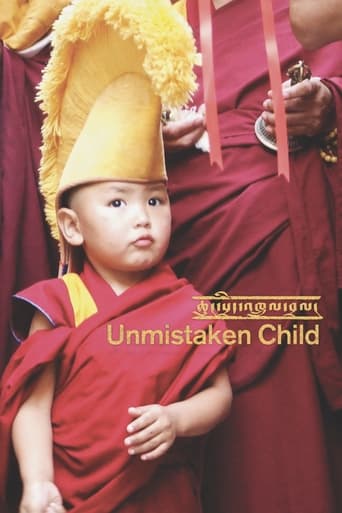

Lack of good storyline.
... View MoreBest movie ever!
... View MoreWhile it is a pity that the story wasn't told with more visual finesse, this is trivial compared to our real-world problems. It takes a good movie to put that into perspective.
... View MoreUnshakable, witty and deeply felt, the film will be paying emotional dividends for a long, long time.
... View MoreComplex. moving, thought provoking and beautifully shot, with a great score.I struggled a bit philosophically at first while watching, since I've been trained in a more western tradition of Buddhism, and don't take the concept of reincarnation literally. And I had an even harder time seeing a tiny child taken from it's family with no say as to his fate. But then I realized that the documentary – which is told without narration – isn't taking sides on whether reincarnation is real, whether this child actually is the reincarnation of the former llama (there are some moments that seem to actively raise question, where it looks like the boy may being guided to give the right answers). It's simply displaying a way of life and a tradition that has gone on for hundreds of years. One that includes the cruelty of separating a child and his family, but that has also led to such important figures as the current Dali Llama, who has done so much for world peace. And, in turn that leads to bigger, important questions about how we raise children. If we never forced children directions against their will at times, we might never have some of our greatest figures in religion, leadership, arts, etc. But in doing so, do we also in some way harm the soul of that child? Where is the line between freedom and tradition? These are important questions, and the film raises them with skill and grace, without attempting to force an easy answer.It's also the very emotional journey of the young monk charged with the difficult and uncertain task of finding the reincarnation of the man he loved and served for many years. Whether your beliefs, you can't help but care for this charismatic and vulnerable monk on his physically, emotionally and spiritually challenging journey.
... View More***SPOILERS AHOY!*** Writing as a practising Buddhist, I saw this gem on TV late one night (it was actually shown on BBC4 as 'The Baby and The Buddha', so watch out for it). Other reviews commend the beauty and emotion of the film, the breath-taking landscapes, and while these are all indeed true, it was the 'affirmation' that touched me most. Let me explain what I mean... Firstly let me apologise for putting such a heavy Buddhist slant on this; I'm hoping there are like-minded people out there who can appreciate what I'm about to say! If not and you're just curious, thanks for looking! OK, here we go.... Watching the child react to being given the Rosary Beads that were his in the previous life, and how he puts them around his neck and won't be parted from them; his reaction to the finger drums, the bells etc of that earlier life; how he shows an unshakable confidence and authority when granting blessings to his disciples, and so on. I found this to be very jarring to watch, and it has been an enormous inspiration to my Dharma practise (following the Buddhist Path). Us 'Westerners' have and will always struggle with the Buddhist belief of Rebirth, and the conditions that naturally arise from this (such as the existence of the 6 Realms, Mother- Beings, etc), but this superb film spells out to us that these aren't just mystical traditions, but ACTUAL occurrences. What better proof do our inquisitive and questioning minds need? Think about it. If you watch the film with a sincere heart, you will become convinced that the child is indeed the Buddhist Geshe reborn, or a 'Rinpoche'. Therefore, rebirth at the end of this life will definitely happen for us all, and it follows that it HAS happened to us countless times before. My Wife struggles with a lot of these concepts, but now I have actual proof to wave under her nose! It's up to us 'Westerners' to suspend our disbelief, and embrace this seemingly far-fetched idea as actual fact. That is why I feel that this film is so important. In the film, Geshe-La was reborn in a Human form because of his life-long devotion to the Three Jewels; if we follow the example ourselves and practise Dharma purely and sincerely (as lay-persons like me, not necessarily as fully ordained Monks) then we will surely be reborn in the Human Realm, and have the precious opportunity to continue our Dharma practises. So, that's what I meant when I said that I found the film to be 'affirming'. It strengthens one's faith in the Buddhist belief of Rebirth, which then inspires one's study of Dharma, and in taking Refuge in the Three Jewels. Amazing stuff. Every Buddhist should own a copy. Go to Amazon and click the buy button RIGHT NOW!!!! lol Thanks for reading :-)
... View MoreA young monk was given the sacred task of finding The One - the reincarnated child of his master who recently passed away. It proved almost too confusing and stressful for him: "Because I never planned for my life, you see. Everything was planned by Geshe-la: You are going to do this, you'll do that. So I always say 'yes', just follow, and I didn't think at all about what is going to happen next." Yet he came through, following the signs, guidance from older monks and his instincts.An interesting character study indeed, of a simple, obedient youth who came from a humble village at the poorest corner of Earth, grew up in a convent, ended up shaping a world event through sheer devotion of religious faith. This is no laughing matter - this zealous personality actually believes everything he dreamed and imagined as the godly truth.One interesting scene that's perhaps the most revealing moment of the film, is when this monk after hours of meditation, appeared spiritually enchanted by the harmonious nature, told the camera: "Everybody would dance, every nature, tree would dance... Such as this flower, so beautiful, happy and free." He unplugged the flower from the back of his ear and started mimicking dancing movement, then suddenly realized the flower would live no longer... so he said: "But sorry anyway, I... I took permission from the tree." It is not hard to imagine what would become of that adorable, bright, innocent little "unmistaken" child. Any amusement I might have felt earlier was completely overshadowed by sadness and grief, after watching the 2nd half of this extremely objective and unflinchingly passive documentary.
... View MoreUnmistaken Child documents another world. It is a world where events that seem to be the products of belief are actually experienced. A deceased saint chooses to be reincarnated; his devoted assistant is asked to locate a child whose body is now inhabited by the saint. Worlds of knowledge that most of us call superstition are brought into play. What is most astounding is that everyone involved in this challenge agrees that the mission and the saint himself, in whatever form he appears, are sacred, and that finding and bringing him to recognition is, as the young assistant says, "a thousand times more important" than anything else.Nati Baratz, the Israeli filmmaker responsible for this amazing movie, started out to make a film about a group of Tibetan Jews. That he was drawn into filming the search for the reincarnated saint and willing to devote over five years of work to that effort is testimony to the power of attraction presented by the monks whose search is documented. That some of the highest spiritual leaders alive today, including the Dalai Lama, allowed Mr. Baratz and his crew to film their intimate meetings and sacred rituals testifies additionally to the deep trust these leaders invested in the filmmaker.We the audience can only watch, perhaps in disbelief, perhaps in reverence of the devotion to task - both the task of locating the reincarnated saint and the task of filming the arduous search. Nothing is asked of us as we watch events unfold. Detail by detail, everything is revealed in its own time. Baratz patiently shows us another way of being, one that challenges and at the same time embraces our Western logic driven frame of reference.Is this film evidence that those who hold the great spiritual knowledge of the East are willing at last to share their knowledge with us? Or are we simply being shown the chasm that divides us from that knowledge? Has the time come for humanity to awaken from its eternity of sleep? Or are we simply being shown another cultural reality? These are some of the questions viewers might ponder after seeing Unmistaken Child.
... View More